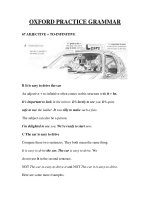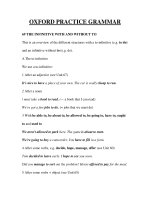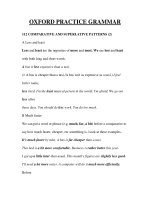Tài liệu OXFORD PRACTICE GRAMMAR 67 pdf
Bạn đang xem bản rút gọn của tài liệu. Xem và tải ngay bản đầy đủ của tài liệu tại đây (183.84 KB, 6 trang )
OXFORD PRACTICE GRAMMAR
67 ADJECTIVE + TO-INFINITIVE
B It is easy to drive the car
An adjective + to-infinitive often comes in this structure with it + be.
It's important to look in the mirror. It's lovely to see you. It's quite
safe to use the ladder. It was silly to make such a fuss.
The subject can also be a person.
I'm delighted to see you. We're ready to start now.
C The car is easy to drive
Compare these two sentences. They both mean the same thing.
It is easy to drive the car. The car is easy to drive. We
do not use it in the second sentence.
NOT The-car-is-easy-to-drive-it and NOT The-car it is-easy-to-drive.
Here are some more examples.
Your writing is difficult to read. A small car would be cheap to run. The
parade was fascinating to watch. The ladder is quite safe to use.
We can use this structure with adjectives meaning 'good' or bad', e.g. awful,
bad, exciting, fascinating,
good, marvellous, nice, terrible, wonderful. We can also use it with these
adjectives: cheap, convenient,
dangerous, difficult, easy, expensive, impossible, safe, simple.
D Certain, sure and likely
We can use a to-infinitive after certain, sure, likely and unlikely.
United are certain/sure to win. (= They will certainly win.)
Sarah is likely to be at work. (= She is probably at work.)
E For and of
After some adjectives we can use for + object + to-infinitive (see Unit 68).
It's important for drivers to take care. It isn't safe for children to play on
ladders.
After an adjective describing how someone behaves (e.g. polite, silly), we
can use of. It
was polite of Emma to write and thank us. (Emma was polite.) It was silly
of me to
forget the tickets. (I was silly.)
68 For with the to-infinitive 117 Too and enough
We can use a to-infinitive (e.g. to
be) after an adjective (e.g. great).
67 Exercises
1 It is easy to drive the car (B)
Sarah's job is to write advertisements. She is writing one for Compex
computers.
Write sentences with it and an adjective followed by a to-infinitive. ► Buy a
Compex computer. It isn't expensive. It isn't expensive to buy a Compex
computer.
1 Using the computer is very simple.
It's very ............................................................................................................
2 Understanding the handbook isn't difficult.
It isn't ...............................................................................................................
3 You can run any kind of software. It's easy.
4 Exploring the world of Compex is absolutely fascinating.
5 Try the ultimate computer experience. Are you ready?
2 The car is easy to drive (C)
Sarah isn't happy with her ideas for the Compex advertisement.
She is rewriting the first four sentences like this. ► A Compex
computer isn't expensive to buy.
1 The computer
...........................................................................................................
2 The handbook
...........................................................................................................
3
...........................................................................................................................
...
4
………………………………………………………………………………
…
3 Certain, sure and likely (D)
Complete the conversation. Make sentences from the notes in brackets.
Nick: Are you going to Mike and Harriet's party?
Tom: Yes, I am. (►) It's sure to be a good party (it / sure / be / a good
party).
Nick: Will there be a lot of people there?
Tom: Yes, (1)
……………………………………………………………………………..(it
/ likely / be / pretty crowded).
Nick: Has Rita been invited, do you know?
Tom: Oh, (2)
...........................................................................................................................
....... (she / certain / be / there).
Nick: I don't know that part of town. Is the house easy to find?
Tom: No, it isn't. Take a map or (3)
..........................................................…………………..(you / unlikely / find /
it).
4 For and of (E)
Vicky and Rachel are talking about two students they know called Gary and
Steve.
Complete the conversation. Put in for or of.
Vickv: I can't believe that Gary and Steve had a fight in a pub. Don't you
think that was very foolish
(►)of them?
Rachel: Yes, it was especially stupid (1).................them to quarrel about
which football team is the best.
There must be something more interesting (2)..................them to talk about.
Vicky: I blame Steve. It wasn't very sensible (3) .................him to knock
Gary's drink over.









